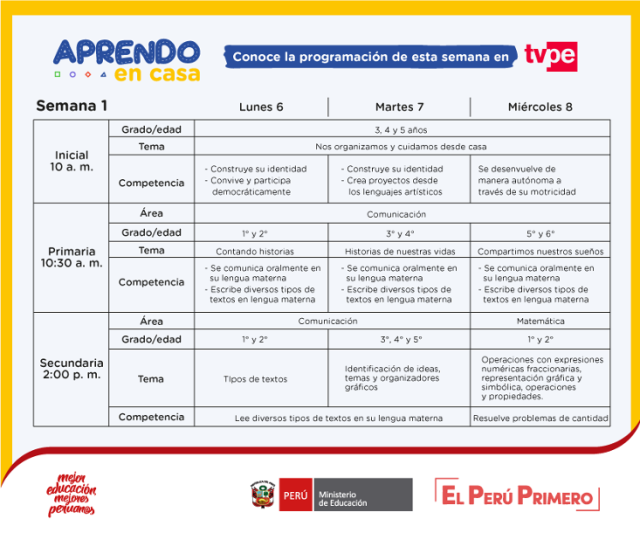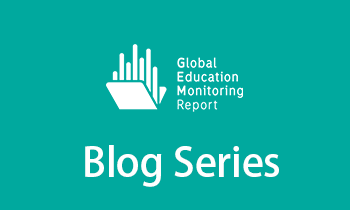By Milagros Lechleiter and Rosa Vidarte, GEM Report
Peru was the first country in Latin American to decree the mandatory social distancing of its population on March 16, only 10 days after detecting its first case of COVID-19. The quarantine has impacted the education of 9.9 million Peruvian students as the start of classes was postponed and face-to-face classes suspended. The Peruvian government’s swift and decisive action has been recognized as one of the best responses to the pandemic in the region. Two Peruvians, working as education specialists at the GEM team and living the crisis in our country from afar, wonder if the response of the education system has been as remarkable as that of the Peruvian central government.
Cooperation is key
On March 27, one day after the announcement of the general quarantine and approximately 10 days after the scheduled opening of the school year, the Ministry of Education (MINEDU) announced the initial phase of a new strategy. The school year will begin with a non-attendance mode on April 6 through Aprendo en Casa, a new distance education strategy for pre-school, primary, and secondary education. MINEDU has announced that as of May 4, classes will progressively begin to be held in person.
Aprendo en Casa is a non-attendance teaching initiative created by MINEDU with the cooperation of private organizations, multilateral agencies, in communication with ministries of education in the region, and for the transmission of content, it has the support of national radio and television companies, and of telecommunication companies (to exempt the consumption of mobile data). Its objective is to cover the school curriculum by integrating new subjects such as citizenship and certain socio-emotional aspects of education; for example, by presenting educational games and readings.

Source : MINEDU.
MINEDU is a key actor in the cooperation and communication efforts among national and regional actors. Among others, MINEDU is supported by UNESCO Peru which seeks to ensure an articulated response to the crisis in the education sector. UNESCO’s efforts include: support to MINEDU in inter-ministerial meetings with other ministries in the region, the organization of virtual discussions by experts and specialists in distance education including a webinar for teachers on socio-emotional tools in contexts of emergency and isolation, and the preparation of a proposal for emergency response with emphasis on rural areas and vulnerable populations.
Having informed students and MINEDU, higher education institutions, including universities (public or private) and graduate schools, have the option to rescheduling their academic calendar or temporarily implementing the non-attendance modality. The National Superintendency of Higher University Education (SUNEDU), responsible for licensing of institutions and validating higher education degrees, has established criteria such as accessibility (economically and physically accessible learning alternatives for students), adaptability (adaptation of subjects and measurement instruments to non-attendance formats) and quality standards to be followed when giving non-attendance classes.
There is an open dialogue between MINEDU and the leaders of teachers’ unions who welcome the implementation of the plan, while emphasizing the importance of teacher training. The ministry has also made available to teachers the teaching materials for the 2020 school year.
The crisis does not affect everyone equally
Another objective of the implemented plan is to guarantee not only equity but also quality of education. For example, its content will be translated into 10 native languages as well as sign language. In terms of ensuring access to all, it is a great effort to have Aprendo en Casa on different platforms such as radio, television and internet. But we must not forget that those with Internet access could have an advantage, both in Aprendo en Casa and for their higher studies, which is especially worrying in a country like Peru where, according to the INEI, only 39% of households nationwide have Internet access and in the rural area only 5%.
Efforts have also been made to help low-income students who benefit from the Qali Warma School Feeding Program. Fifty thousand schools nationwide had already received food rations to be distributed in March. The Ministry of Development and Social Inclusion will re-establish the food supply beginning on April 6 to benefit about 1.1 million students even when schools remain closed. Such strategies help inclusion, as the GEM 2020 Report on education and inclusion and the regional report focusing on Latin America and the Caribbean will show.
With about 630,000 Venezuelans with residence permits and 480,000 asylum seekers, Peru is the second largest country in Latin America receiving Venezuelans. They, Venezuelans and others, have skills, including in health, that can be put to good use during this emergency. Since 2017, SUNEDU has recognized about 3,300 Venezuelan professional degrees in health sciences and psychology, of which 1,751 are in medicine and 126 in nursing. Given the emergency, SUNEDU is now giving priority to the recognition of foreign degrees and diplomas in the area of health. In emergencies such as this, the need to adopt a system such as the UNESCO qualifications passport for refugees and vulnerable migrants is even clearer
A system on the right track
It is in times of crisis that the resilience of a system can be noted. Although no country could have been fully prepared to face this crisis, Peru is on the right track. In a socially fragmented and unequal country like Peru, seeing multiple actors of the education sector working together organically as part of a system with the common goal of safeguarding the right to education for all students, is a sign of hope. The great effort and cooperation that has given rise to the Aprendo en Casa system will continue beyond the quarantine, as the system will be complementary to face-to-face classes to provide learning opportunities for students in remote areas such as rural settings.





Pingback: The Peruvian education system: seeking quality and equity during COVID-19 times — World Education Blog | AVANT-GARDE EDUCATION
Pingback: El sistema educativo peruano: buscando calidad y equidad durante COVID-19 – OtrasVocesenEducacion.org
En realidad el programa APRENDO EN CASA a superado las expectativas que la mayoría de Docentes, padres de familia y autoridades tenían, las evidencias recogidas por las docentes así lo demuestran y como se señala en el Perú “el 39% de los hogares en todo el país tienen Internet acceso y en el área rural solo 5%..” las redes sociales han jugado un papel importante para realizar este buen trabajo que esperamos siga siendo un éxito superando todas las dificultades que se presenten con el lema EL PERÚ ES PRIMERO.
LikeLike
No comparto su opinión ya que la realidad demuestra todo lo contrario ante las grandes desigualdades que presentan nuestras poblaciones de zona rural y la ciudad. Inclusive dentro de la misma zona urbana existe grandes desigualdades en relación al acceso de internet y la calidad de este servicio. Por otro lado, la calidad de la emisión de los programas y el tiempo y frecuencia que se dan para los niveles educativos de primaria y seecundaria son insuficientes, y las clases onlique de manera masificada en toda la EBR es una ilusión.
LikeLike
Pingback: Peril in the Amazon during Covid 19 | Powering Potential
I just come across one of the top international conference alert providing website portal. The main objective of their website is to inform the forthcoming international conferences to global researchers, students, scientists and academic professionals. You can learn explore new stuffs
Website: https://allconferencealert.net/
LikeLike